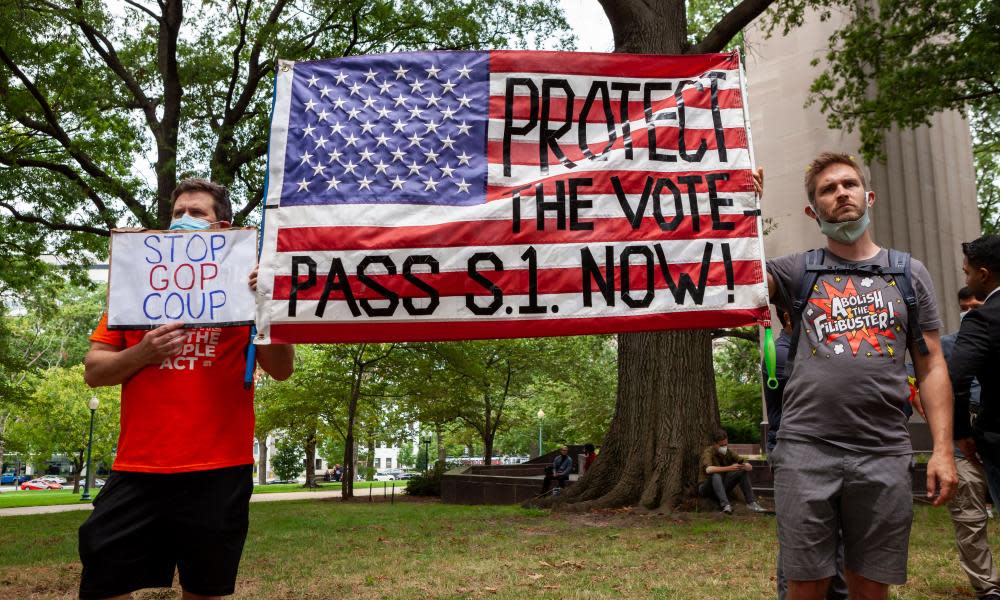Senate Democrats poised for voting rights push to counter Republican restrictions

- Oops!Something went wrong.Please try again later.
- Oops!Something went wrong.Please try again later.
Top Democrats in the Senate are poised to make another attempt to push through voting rights legislation before the chamber leaves Washington for a summer recess, in a sign of their determination to counter a wave of Republican-led ballot restrictions across the nation.
Related: Biden hails Senate passage of giant $1tn bipartisan infrastructure bill
The Senate majority leader Chuck Schumer is expected to reintroduce Democrats’ marquee election reform bill known as the For the People Act, with additional votes on one measure to end partisan gerrymandering and another measure to tighten campaign spending, sources said.
None of the measures, for which Schumer hopes to schedule votes immediately after the Senate takes up the $3.5tn budget blueprint for infrastructure, is expected to garner any Republican support and will thus likely follow the demise of the For the People Act in June.
The move by Senate Democrats will encourage voting rights activists, who have watched with alarm that the issue appeared to have taken a back seat as protracted negotiations over the $1tn bipartisan infrastructure package consumed the Senate.
Yet in the face of united Republican opposition, the endgame for Democrats – even as they scramble to enact voting rights legislation to roll back a wave of GOP ballot restrictions in time for the 2022 midterm elections – remains unclear.
The only conceivable path for Democrats to ensure passage of the voting rights bills would require reforming the Senate’s filibuster rule, an option not currently available to party leaders after holdouts last week reiterated their opposition.
Senator Kyrsten Sinema on Friday told ABC that she continued to support the 60-vote requirement for the filibuster, days after senator Joe Manchin said anew that he would not acquiesce to carving out a voting rights exemption from the rule.
Democrats face a time crunch as they prepare for the 2022 midterms, when they hope to mitigate Republican gains after House district lines are redrawn on the results of last year’s census.
Democrats are particularly determined to curb partisan redistricting, which could allow Republicans to gain enough seats to reclaim the House majority and thwart their ambitions of enacting Joe Biden’s legislative agenda in the second half of his first term.
And with some Republican-led states racing to redraw lines once the Census Bureau releases detailed population data on 12 August, advocates for stronger federal voting rights laws have warned that Congress needs to act before mid-September in order to affect 2022 balloting.
To that end, a group of Democrats led by Senate rules chair Amy Klobuchar and Senator Jeff Merkley have continued to work on voting rights legislation in an attempt to keep up momentum against GOP ballot restrictions based on Trump’s lies about a stolen election.
Some Democrats involved in the effort were optimistic that they could introduce this week a For the People Act version 2.0 that incorporated elements from a three-page, scaled-down version of the bill proposed by Manchin two months ago, the sources said.
But the legislation was not complete as of Tuesday, and Democrats crafting the voting rights legislation now expect Schumer to try to again advance the For the People Act after the Senate completes a set of marathon rapid fire votes on the $3.5tn budget blueprint.
The group, which also includes senators Alex Padilla, Tim Kaine, Angus King and Raphael Warnock, anticipate Schumer will then schedule votes on two measures from Manchin’s proposal: one that aims to counter partisan gerrymandering, and another to combat so-called dark money in politics.
The stakes are significant both for Warnock, who is on the ballot next year, as well as for the Democratic caucus more widely, since the loss of his seat in the battleground state of Georgia could shunt the party back into the minority in the 50-50 Senate.
And Warnock faces an uphill struggle in seeking re-election as he prepares to run in a state where Republicans have moved decisively to limit mail-in-ballots, curb early voting and shift electoral power towards the Republican-led state house.
After Republicans blocked the For the People Act, the most far-reaching election reform legislation to come before Congress in a generation, the Senate majority leader vowed to redouble his efforts.
“In the fight for voting rights, this vote was the starting gun, not the finish line,” Schumer said. “We will not let it go. We will not let it die. This voter suppression cannot stand.”
But some Democrats have signalled skepticism about forcing an almost certainly futile votes measure now, in a rushed move they say could erode potential Republican support should they try to enact bipartisan voting rights bills in the future.
Before the vote on the For the People Act in June, Democrats reached out across the aisle to encourage centrists such as Lisa Murkowski to back the legislation. In a sign of the pessimism about the success of the forthcoming votes, there has been no such effort this time, the sources said.

